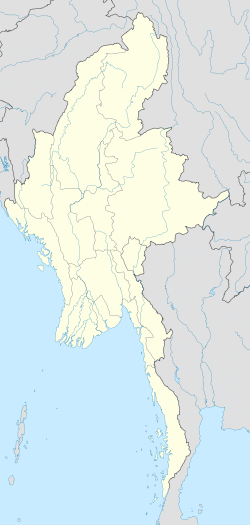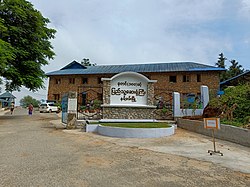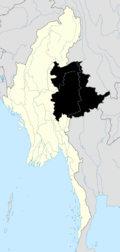Namhkam, Shan State
Namkham နမ့်ခမ်းမြို့ | |
|---|---|
Town | |
 | |
| Coordinates: 23°50′00″N 97°41′00″E / 23.83333°N 97.68333°E | |
| Country | |
| Division | |
| District | Mu Se District |
| Township | Namhkam Township |
| Control | |
| Area | |
• Total | 4.52 sq mi (11.71 km2) |
| Elevation | 2,489 ft (759 m) |
| Population (2019)[1] | 33,382 |
| • Ethnicities | Shan Palaung |
| • Religions | Buddhism |
| Time zone | UTC+6.30 (MMT) |
Namhkam (Burmese: နမ့်ခမ်းမြို့; Shan: ၼမ်ႉၶမ်း; Tai Nüa: ᥘᥛᥳ ᥑᥛᥰ), also spelled Nam Kham is the principal town of Namhkam Township in northern Shan State, Myanmar, situated on the southern bank of the Shweli River near the border with Yunnan Province, China.
History
The region surrounding Namhkam originally belonged to China, but from 1894 to 1897, the British colonial administration in Burma built a road between this frontier town and Bhamo by the Ayeyarwady River in Kachin State for a distance of 56 miles (90 km). The road was intended to be used by Chinese muleteers for the benefit of border trade.[2]
During the Second World War, the Allies built the Ledo Road, stretching from Ledo in Assam, India to Kunming, China, across northern Burma. By the end of 1944, the road stretched 439 miles (707 km) to Namhkam, linking up with the old Burma Road at Bhamo.[3][4]
In 2005, the Shan State Army - South attempted to fill a power vacuum in Namhkam left by the 1989 ceasefire agreement between their counterparts in the north and the Burmese military, but their attempt was promptly thwarted.[5][6]
The governments of Myanmar and China have been working to resolve a border dispute in the area of Namhkam and Muse since 2014.[7]
On 6 November 2023, the Namkham police station was captured by Ta'ang National Liberation Army (TNLA) fighters, bringing the city under the limited control of the Brotherhood Alliance during the ongoing civil war.[8] Anti-junta forces took full control of the town and surrounding township on 18 December 2023.[9][10]
Education
As of 2017, there are two high schools, three middle schools, 100 primary schools and one monastic school in Namhkam.[11]
Agriculture
Cultivation of the opium poppy in the area during British rule caused considerable deforestation, noted in 1920 east of a line from Lashio to Namhkam.[12] A 2005 survey by the Shan State Peace Council recorded 1,800 drug addicts in Namhkam alone. Community-run rehabilitation centers were set up to tackle the rising problem of addiction. The first of these facilities were constructed in 1998, but were declared illegal and forced to close down in 2000 by authorities.[13] Buddhist monks and teachers in Namhkam are also involved in the amelioration of the HIV/AIDS issue amongst drug users.[14]
Hsinshweli high yield hybrid rice cultivation has been promoted in recent years by authorities in the region.[15] The results were disaterous for Shan farmers and left many of them in destitute.[16]
Development
Myanmar and China signed a contract in August 2003 for the construction of the hydroelectric Shweli I Dam on the Shweli River near Namhkam, aiming to supply electricity to Kyaukme, Hsipaw, Lashio and Namtu.[17] It was completed in 2009 and has a 600 MW installed capacity.[18]
Notable people
Burmese American Dr. Gordon Seagrave, famously known as the "Burma Surgeon", ran the American missionary hospital overlooking Namhkam.[4][19] He was believed to have had military intelligence duties as well as medical ones,[19] and he later wrote articles on his experience in Namhkam.[20]
Gallery
References
- ^ Myanmar Information Management Unit (2019). Namhkan Myone Daethasaingyarachatlatmya နမ့်ခမ်းမြို့နယ် ဒေသဆိုင်ရာအချက်လက်များ [Namkham Township Regional Information] (PDF) (Report). MIMU. Retrieved 8 November 2023.
- ^ Nisbet, John (1901). Burma Under British Rule and Before. Adamant Media Corporation, 2005. pp. 36–40. ISBN 978-1-4021-5293-1. Retrieved 2009-03-03.
- ^ Carl Warren Weidenburner. "The Ledo Road- MILEPOSTS". University of Oklahoma Press. Archived from the original on 2007-12-20. Retrieved 2009-03-02.
- ^ a b Win Nyunt Lwin. "Historic road links wilderness and culture". Myanmar Times October 4–10, 2004. Archived from the original on 2008-10-06. Retrieved 2009-03-04.
- ^ "Curfew for northern township follows rout". S.H.A.N. 2005-12-29. Archived from the original on 2009-02-11. Retrieved 2009-03-04.
- ^ "The big chase". S.H.A.N. 2006-01-03. Archived from the original on 2009-02-11. Retrieved 2009-03-04.
- ^ Nyein, Nyein (1 August 2014). "Burma Working With China on Border Dispute in Shan State, FM Says". The Irrawaddy. Retrieved 12 August 2018.
- ^ Now, Myanmar (2023-11-06). "နမ့်ခမ်းတစ်မြို့လုံးနီးပါး TNLA ထိန်းချုပ်". Myanmar Now. Retrieved 2023-11-06.
- ^ https://twitter.com/Myanmar_Now_Eng/status/1737453983201992880 [bare URL]
- ^ "TNLA Declares Complete Control over Namhkam Township, Including Military Council's Sakhanthit Hill Base".
- ^ "Shan Herald Agency for News (S.H.A.N.)". Shanland.org. Archived from the original on 29 November 2014. Retrieved 17 November 2014.
- ^ "Replacing Opium in Kokang and Wa Special Regions, Shan State, Myanmar" (PDF). UNODC. 2003. p. 6. Retrieved 2009-03-02.
- ^ "Community-run rehab centers in the north". Shan Herald Agency for News (S.H.A.N.). Archived from the original on 2009-02-11. Retrieved 2009-03-04.
- ^ The Sangha Metta Project (November 2000). "HIV/AIDS education and training in Yunnan, China and the Shan State, Burma". buddhanet.net. Retrieved 2009-03-04.
- ^ "Lt-Gen Aung Htwe inspects harvesting, cultivation tasks in Namhkham". New Light of Myanmar. June 12, 2004. Archived from the original on September 3, 2005. Retrieved 2009-03-02.
- ^ "Burma: Seedlings of evil". grain.org (in Spanish). Retrieved 2021-12-24.
- ^ "Shweli Hydel Power Project". Ministry of Foreign Affairs. September 1, 2003. Archived from the original on January 15, 2006. Retrieved 2009-03-03.
- ^ "Myanmar to implement some six hydropower projects". People's Daily online, April 21, 2007. Retrieved 2009-03-03.
- ^ a b "World War II Timeline:Chinese struggles to provide medical care". HowStuffWorks. 11 September 2007. Retrieved 2009-03-02.
- ^ "SEAGRAVE GS". Ncbi.nlm.nih.gov. Retrieved 17 November 2014.
External links
- Satellite map GeoNames
- Taipei American Chamber of Commerce; Topics Magazine, Analysis, November 2012. Myanmar: Southeast Asia's Last Frontier for Investment, BY DAVID DUBYNE
- Oilseedcrops.org; Editor Article, Transit routes from western China through Myanmar. Myanmar: the Missing Link from Western China to India’s N.E. States






